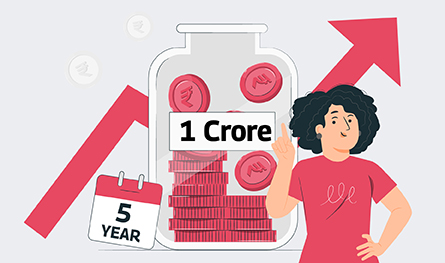Top 5 Ayurvedic Herbs to Manage PCOS Symptoms | Understanding the 4 Types of PCOS for Better Management
.png)
Polycystic Ovary Syndrome (PCOS) is a common hormonal disorder that affects women of reproductive age. While lifestyle changes and medical treatments play a major role in managing PCOS, Ayurveda offers a natural approach to control the symptoms and improve overall well-being. In this blog, we’ll explore the top 5 Ayurvedic herbs that can help manage PCOS symptoms, and also break down the 4 types of PCOS for better management.
.png)
Additionally, we’ll discuss the importance of getting a best health insurance plan and how a super top-up health insurance plan can provide extra coverage for women managing PCOS and other health conditions.
What is PCOS? (Polycystic Ovary Syndrome)
PCOS, or Polycystic Ovary Syndrome, is a common health condition that affects how a woman’s ovaries work. It is mainly caused by a hormonal imbalance and can affect your periods, weight, skin, hair, and even your ability to get pregnant.
In a normal menstrual cycle, the ovaries release one egg each month. But in women with PCOS, this process doesn’t work properly. The ovaries may not release an egg every month, or the egg may not fully mature. This can lead to irregular periods or missed periods. Also, small fluid-filled sacs called cysts may form on the ovaries—hence the name polycystic ovary syndrome (poly = many, cystic = cysts).
PCOS Is a Hormonal Disorder
The main problem in PCOS is hormonal imbalance. Women with PCOS may have:
- Too much insulin (a hormone that controls blood sugar)
- Too many androgens (male hormones like testosterone)
- Low levels of female hormones that help with ovulation
This imbalance affects your body in different ways—from irregular cycles and acne to weight gain and hair issues.
Who Can Get PCOS?
PCOS can affect girls as young as 12 or 13 (just after puberty), and women up to their 40s. It’s very common—1 in 10 women may have it. Sometimes, women don’t even know they have PCOS until they have trouble getting pregnant or visit the doctor for irregular periods.
It can also run in families. So, if your mother or sister has it, there’s a higher chance you might have it too.
Common Signs & Symptoms of PCOS:
- Irregular periods or no periods at all
- Excess hair growth on face, chest, or stomach
- Acne or oily skin
- Hair thinning or hair fall
- Weight gain, especially around the belly
- Difficulty getting pregnant
- Mood changes, depression, or anxiety
- Dark patches of skin on the neck or underarms (a sign of insulin resistance)
5 Ayurvedic Herbs to Manage PCOS Symptoms
1. Ashwagandha (Withania somnifera)
Ashwagandha is one of the most powerful Ayurvedic herbs known for its ability to reduce stress and balance hormones. Women with PCOS often face hormonal imbalances that can lead to symptoms like irregular periods and weight gain. Ashwagandha helps regulate the stress hormone cortisol, which in turn helps manage the underlying hormonal imbalances in PCOS.
- How to Use: Take Ashwagandha powder (500 mg) once or twice a day, mixed with warm water or milk.
- Benefits: Reduces stress, balances hormones, and may help with ovulation.
2. Shatavari (Asparagus racemosus)
Shatavari is a well-known herb in Ayurveda for supporting female reproductive health. It helps in regulating menstrual cycles, boosting fertility, and managing symptoms like acne, excessive hair growth (hirsutism), and weight gain that are commonly seen in PCOS.
- How to Use: Take 1–2 teaspoons of Shatavari powder with warm water or milk daily.
- Benefits: Supports menstrual regularity, reduces inflammation, and improves fertility.
3. Turmeric (Curcuma longa)
Turmeric has anti-inflammatory properties that are essential in managing PCOS. Women with PCOS often experience inflammation, which can worsen symptoms. Turmeric helps to lower inflammation, regulate blood sugar levels, and improve insulin resistance—an important aspect of managing PCOS.
- How to Use: Add a pinch of turmeric to warm milk or water, or use it in cooking.
- Benefits: Reduces inflammation, improves insulin sensitivity, and supports weight loss.
4. Tulsi (Holy Basil)
Tulsi, or Holy Basil, is a natural herb known for its detoxifying properties. It helps balance blood sugar levels and reduce stress, both of which are key factors in managing PCOS. Regular use of Tulsi can also support the immune system and improve skin health.
- How to Use: Drink Tulsi tea or chew a few fresh leaves daily.
- Benefits: Reduces stress, balances blood sugar, and supports overall health.
5. Fenugreek (Methi)
Fenugreek is another herb that plays a crucial role in managing PCOS symptoms, particularly when it comes to regulating blood sugar levels and managing weight. Fenugreek seeds are rich in fiber, which helps control blood glucose and insulin levels, reducing the chances of insulin resistance in women with PCOS.
- How to Use: Soak a teaspoon of fenugreek seeds overnight and consume them the next morning with warm water.
- Benefits: Improves insulin sensitivity, regulates blood sugar, and supports weight management.
Understanding the 4 Types of PCOS for Better Management
PCOS is not a one-size-fits-all condition. It can manifest in different forms, which is why it’s crucial to understand the 4 types of PCOS to manage them effectively. Here’s a breakdown:
1. Insulin-Resistant PCOS (Most Common Type)
Cause: High insulin levels (a hormone that controls blood sugar). This leads to weight gain, sugar cravings, acne, and irregular periods.
Symptoms:
- Belly fat
- Constant tiredness
- Craving sugar or carbs
- Dark patches on the neck or underarms
Management Tips:
- Cut back on sugar, white bread, and processed foods.
- Eat more protein, fiber, and healthy fats.
- Exercise regularly (brisk walking, yoga, strength training).
- Cinnamon, fenugreek, and apple cider vinegar may help balance blood sugar.
- In some cases, your doctor may prescribe Metformin.
2. Inflammatory PCOS
Cause: Chronic inflammation in the body which disrupts ovulation and raises androgen (male hormone) levels.
Symptoms:
- Fatigue
- Joint pain
- Acne or skin rashes
- Headaches
- Digestive issues (bloating, IBS)
Management Tips:
- Avoid inflammatory foods: processed snacks, fried food, sugar, dairy.
- Add anti-inflammatory foods: leafy greens, berries, turmeric, ginger.
- Manage stress through meditation or deep breathing.
- Get enough sleep and stay hydrated.
- Natural supplements like omega-3s or curcumin may help.
3. Post-Pill PCOS
Cause: This type occurs after stopping birth control pills, especially if you had no PCOS symptoms before taking the pill. Your body takes time to regulate hormones again.
Symptoms:
- Irregular periods after quitting the pill
- Acne or hair fall
- Mood swings
Management Tips:
- Be patient—it may take 3 to 6 months for hormones to balance.
- Support your body with a clean diet and hormone-friendly foods (flaxseeds, leafy greens).
- Try vitex (chasteberry), a natural herb that supports hormone balance.
- Focus on gentle exercise and managing stress.
4. Adrenal PCOS
Cause: Triggered by stress, not insulin. Your body produces excess DHEA-S, a stress-related male hormone.
Symptoms:
- Normal insulin levels
- High DHEA-S on blood test
- Anxiety or feeling wired
- Poor sleep
- Irregular periods or no periods
Management Tips:
- Focus on stress management: deep breathing, yoga, nature walks.
- Avoid high-intensity workouts that raise stress hormones.
- Cut caffeine and sugar.
- Magnesium, ashwagandha, and B vitamins may help.
- Get 7–8 hours of sleep every night.
Why Health Insurance Still Matters in Natural PCOS Management
Even if you're managing PCOS with Ayurvedic herbs, diet, and lifestyle changes, regular health checkups and monitoring hormone levels are still important. Ayurvedic treatments often work best when supported by diagnostic tests and occasional consultations with both Ayurvedic and allopathic doctors.
In such cases, having the best health insurance plan ensures you can cover expenses related to tests like hormone panels, ultrasound scans, and doctor visits. If you ever need to combine natural remedies with conventional treatments—especially in cases of fertility support or advanced symptoms—your insurance can be a financial cushion.
For those managing PCOS long-term, a super top-up health insurance plan adds an extra layer of protection. It helps you stay prepared for unexpected health expenses without compromising your preferred natural treatment path.
FAQs on Top 5 Ayurvedic Herbs to Manage PCOS Symptoms
Ashwagandha is ideal for adrenal PCOS, as it balances cortisol levels and supports healthy adrenal function.
Yes—turmeric’s active compound, curcumin, has strong anti-inflammatory and insulin-sensitizing effects that can ease PCOS symptoms.
Your doctor can diagnose your PCOS type based on blood tests (hormone panels), symptoms (e.g., insulin resistance, inflammation), and ultrasound findings.
Generally, yes—many herbs complement each other. However, start one at a time, monitor your response, and consult an Ayurvedic practitioner for personalized dosing.
Absolutely—regular hormone panels and ovarian ultrasounds help you track progress and ensure your natural regimen is effective.

Author Bio
Paybima Team
Paybima is an Indian insurance aggregator on a mission to make insurance simple for people. Paybima is the Digital arm of the already established and trusted Mahindra Insurance Brokers Ltd., a reputed name in the insurance broking industry with 17 years of experience. Paybima promises you the easy-to-access online platform to buy insurance policies, and also extend their unrelented assistance with all your policy related queries and services.
Latest Post
.png)
If you are planning to buy two-wheeler insurance and are seeking answers to some frequently asked questions, look no further. Read on to know the two wheeler insurance FAQs related to bike insurance policy in this post.


Let’s be honest – life insurance planning isn’t exactly someone’s weekend hobby. It is the financial equivalent of flossing: we understand its importance, but we tend to put it off. But somewhere between balancing work and life, you might realise you need to have a solid plan in place – just in case.


If you think of life insurance, chances are you are picturing something people buy in their 30s or 40s. But what if you are 65 or older and just getting started? The good news is that you are never too late. Whether you are thinking of easing the financial burden on your family, covering final expenses, or simply leaving behind a legacy, there are life insurance options tailored just for you.
This article will be a guide to life insurance for senior citizens above 65 years, explaining why it is important, the type of insurance options, and how to get the right policy for you.


Health insurance plans are purchased with the hope of medical protection in times of need. However, sometimes it ends up being a source of surprise and disappointment. This mostly happens when people rush to buy health insurance plans, often overlooking essential aspects. Ignoring waiting period clauses, misunderstanding exclusions, and being unaware of sub-limits can lead to unwanted problems in the future.


If you are looking at investment policies offering INR 1 Crore in 5 years, we talk about some excellent plans in this post to help you choose the best one and reach your goal. However, it is important not to get swayed. Doing proper research and taking advice from financial or insurance advisors is important. Learn about such investment plan in this post.




